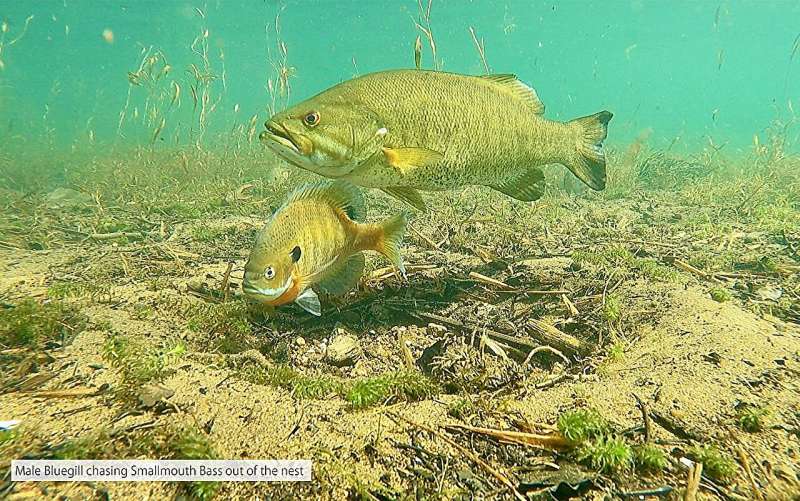This article has been reviewed according to Science X's editorial process and policies. Editors have highlighted the following attributes while ensuring the content's credibility:
fact-checked
trusted source
proofread
Colony spawning and enhanced brood protection in invasive bluegill found to facilitate their spread

Bluegill, recognized as aggressive invaders causing significant harm to native species, have been introduced to aquatic systems worldwide, including Japan. Their unique colony spawning involves males constructing nests in close proximity to one another, with each male guarding its own nest. However, these behaviors remain understudied in invaded habitats.
To address this gap, researchers from the University of Tsukuba examined spawning behavior and brood predators in Lake Nojiri, Northern Nagano Prefecture, Japan, using underwater video analysis and experimental guarding male removal. Their study was published in the North American Journal of Fisheries Management.
Bluegill were observed spawning in shallow habitats from June through July, with nests occurring in loosely aggregated colonies as well as numerous solitary nests (35%). Males displayed various guarding behaviors, such as rim circling, predator chases, and paternal investment behaviors, such as tail fanning. Removal of guarding males revealed four brood predator species totaling 105 individuals, with conspecific bluegill constituting >90% of all brood predators.
Consistent with the colony spawning theory, nests located closer to other nests with active guarding males experienced reduced brood predation and increased predator arrival time following male removal. Additionally, nests where males exhibited more aggressive guarding before removal showed decreased brood predation later on.
These findings suggest that the absence of native brood predators, coupled with the advantages of colony spawning, has likely facilitated the successful establishment of bluegill throughout Japan. Furthermore, the common guarding male removal management strategy in Japan may be less effective due to the influence of colony spawning.
More information: Miles I. Peterson et al, Male guarding behavior and brood predators of invasive Bluegill in a Japanese lake, North American Journal of Fisheries Management (2024). DOI: 10.1002/nafm.10976
Provided by University of Tsukuba


















